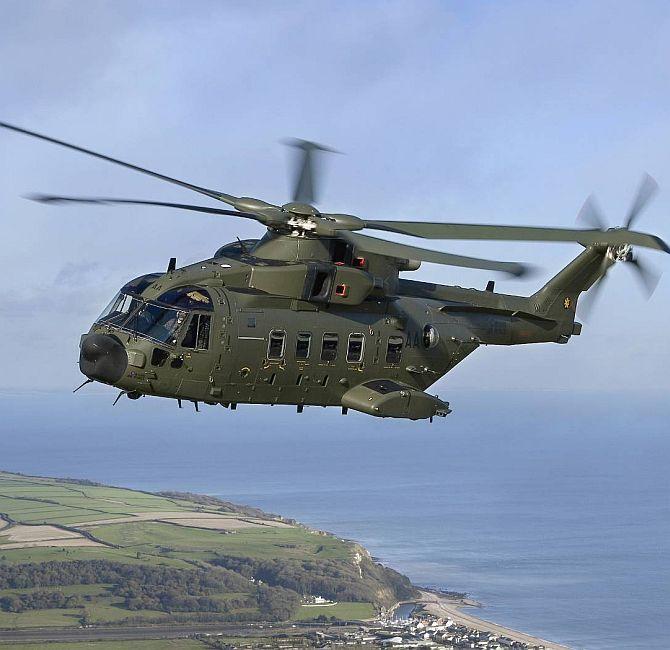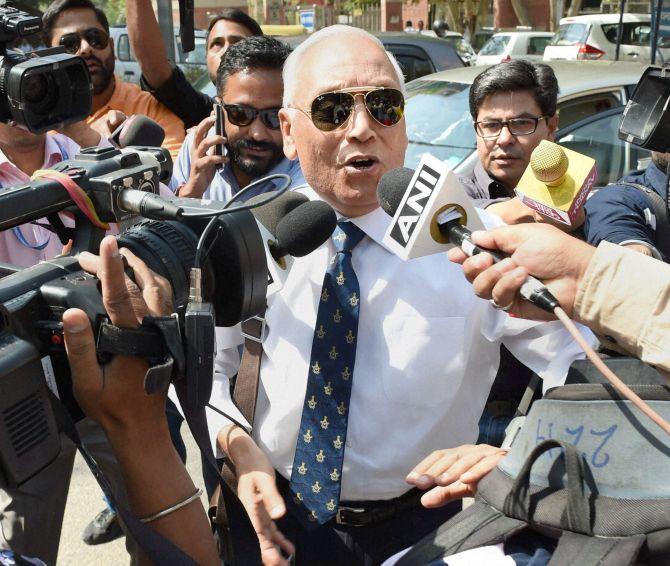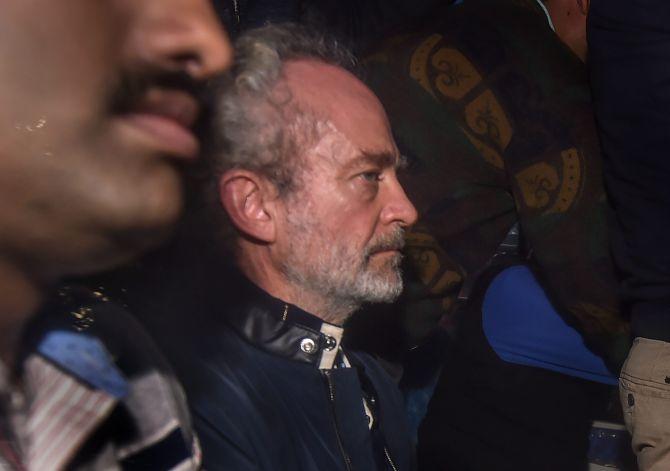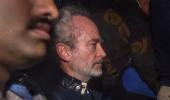Christian Michel's investigation in New Delhi has revealed nothing substantial, contrary to the expectations of the prime minister and the media hype.
A fascinating excerpt from Raju Santhanam's The Untold Story of Christian Michel and Agustawestland.

More than five years have elapsed since the CBI first registered the AgustaWestland case in February 2013.
So where does it go from here?
The investigation may take four to five years to reach some sort of conclusion.
Chargesheets have already been filed, some additional charge sheets will no doubt be filed separately and more witnesses called.
Besides, the Indian investigation has yet to be completed.
According to the Indian prosecuting authorities, the Italian supreme court judgment in February 2018 (where everyone was exonerated) has no bearing on the case.
As things stand, what it will all add up to, finally, can only be a matter of conjecture.
Based on available facts and information, the main allegation of involvement of a public servant in a bribery case (in this instance, former Air Chief Marshal S P Tyagi) is expected to fall flat.
Even if someone does squeal, there has to be enough corroborative evidence to support the involvement of a public servant.
In a conspiracy case of a criminal nature, the involvement of a public servant is extremely difficult to prove.
When did they (Tyagi and the alleged co-conspirators, Guido Haschke and Christian Michel) meet?
Were there other witnesses?
Can a money trail be linked to public servants? All this would call for a tight, irrefutably time-consuming probe.
As per the law, there has to be sufficient proof that the public servant met the middlemen and that there was an exchange of money in return for the favour -- that of lowering the ceiling height of the helicopters -- which made AgustaWestland eligible and finally win the race.
About the Tyagis-middlemen meeting

There have been details and disclosures in the courts from Haschke.
But he has also claimed that the meetings were nothing out of the ordinary.
At least three meetings with the Tyagis were confirmed (whether it was formal or informal is not known) out of which one interaction led to an official meeting with a Finmeccanica official.
Christian Michel claimed that except for one chance meeting with the Tyagis, when he was introduced to them by Haschke, he barely knew them.
Money exchange
There is no proof of money being exchanged.
In granting bail to Air Marshal Tyagi, the court observed that there is little chance that he would tamper with witnesses.
The special CBI court also stated in its order that the CBI had failed to state the amount of cash paid to the accused and when it was paid.
'The apprehension of the CBI that the accused may tamper with the evidence is without any basis... Further... the apprehension of the CBI that he would be influencing the witnesses, who had been subordinate to him during the tenure of his service appears unfounded,' read the order of Special CBI Judge Arvind Kumar.
The order also mentions that the CBI had seized documents regarding S P Tyagi's properties in 2013 'and more than three years and nine months have passed, but could not conduct investigation in this regard'.
The CBI had mentioned in its arrest memo of S P Tyagi that his properties are to be linked with 'illegal gratification'.
Was Air Chief Marshal Tyagi responsible for the lowering of the ceiling height for the choppers? The Italian supreme court is categorical that this happened even before the air chief marshal took over.
Evidently, the claim of Haschke that he 'fixed' the ceiling issue proved to be just part of an empty boast to extort money (as per the clear implication in the Italian court judgement).
The decision on the ceiling was taken on November 19, 2003.
Air Chief Marshal Tyagi was appointed as Indian Air Force chief on December 31, 2004, more than a year later.
Michel met Orsi for the first time only on December 6, 2006 after the RFP (Request for Procurement) was issued.
That makes Michel an unlikely suspect in ensuring that the ceiling height was lowered in favour of AgustaWestland.
That's as far as the CBI is concerned.
In the case of the enforcement directorate, there is a long money trail chase.
Haschke, they discovered, has a money trail that goes all around Mauritius whereas in the case of Michel, it is straightforward - to his travel agency cum business partner.
None of these money trails seem to be from hawala channels.
Also, money laundering has to be established if there is evidence that a public servant was paid the money and has committed some wrongdoing.
So far, no such evidence has trickled in; this makes the task of the ED tougher.
Under the Money Laundering Act, they can seize property, etc, on just mere suspicion of money laundering.
The onus is on the accused to prove their innocence.
But this case, like the Bofors case, is clearly going to be a long haul.
The Bofors case stretched for over a decade though it was being investigated by two of the cleanest officials then, namely Arun Jaitley and K Madhavan of the CBI.
I knew both of them.
Questions that are still being asked, such as who let Quattrocchi escape? Could anything more have been gleaned from Swiss courts? My understanding is that Madhavan and Jaitley were helped out of the way by the Swiss who were impressed by their dogged determination.
Journalist Chitra Subramanian pursued leads and gave breakthroughs for about ten years, which proved to be decisive.
But in the final round, nothing conclusive could be established.

In this case too, there is no doubting the determination with which all agencies are pursuing the case.
The manner in which Michel was brought to India may be legally questionable, but it's a case of ends justifying the means.
Michel's investigation in New Delhi (currently he is lodged in Tihar jail), has revealed nothing substantial, contrary to the expectations of the prime minister and the media hype.
Can more revelations be expected if Michel talks? So far, he has reportedly repeated just two lines -- a. there is no wrongdoing, and b. there is also no question of any political involvement.
Recently, a new element has been brought into the scene in the person of Rajiv Saxena, a financial consultant from Dubai.
He was bundled into an aircraft and brought to India.
However, his name does not figure in the Italian courts.
This is apparently a result of the Indian end to the investigations.
Nothing is really known as to what Rajiv Saxena will say.
He has been granted the status of an approver, probably in the hope that his statements would add value if it implicated politicians.
But proving the case in a court of law is quite another matter.
In the case of Michel, the authorities are looking closely at the Euro 18 million (approximately Rs 140,38,51,397) spent on the buyback of the WG-30 from Helicopter Corporation.
It now transpires they were not bought back from India.
Michel is said to have issued a statement to suggest that he did look at the choppers but found them worthless.
Then why was he paid the money? He claims his mandate was to buy back WG-30 not just from India but the rest of the globe.
Where does the story stand so far? The new 'revelations' are from Rajiv Saxena.
There are no Michel connections here.
Saxena's links are with Khaitan, a lawyer close to Gerosa, Haschke's partner.
His revelation has led to the arrest of one Mr Gupta whose family, it is claimed, had connections with middlemen in arms deals.

Eventually, where all this will go is anyone's guess.
But what is going to be the fate of all the principal characters involved in this 'scam' bears some pondering.
Haschke is in a Swiss village after having signed an out-of-court approver plea in return for his testimony.
It would not be easy to get him.
Besides, there are far too many contradictions in his statements.
His partner, Gerosa, cannot be brought back because Italy does not have any extradition treaty with India.
Orsi and Spagnolini, the senior Finmeccanica and AgustaWestland officials, have been acquitted by the highest court in Italy.
There is virtually no scope for the investigation to restart in Italy.
Michel himself was also acquitted by the Italian supreme court.
But he remains the only one in custody in India.
Others facing charges -- the Tyagis -- are out on bail.
Authorities in India claim that in spite of the Italian supreme court's clean chit, the investigation would continue because new facts have emerged.
Yet, it is difficult to imagine how the Indian end of the case would be proved differently in a court of law.
Firstly, Agusta officials accused of wrongdoing have been proved innocent in Italy.
Secondly, the so-called middlemen too have been acquitted.
And thirdly, can testimony in Italy be used by the prosecution in India?
Finally, are there grounds for using the Italian prosecution testimony when it has failed to prove its case?
If the Government of India would have to bring Agusta officials exonerated by the Italian courts to India, would they not be governed by laws of double jeopardy?
These are questions that call for clear, unequivocal, answers.
Could there be a connection between the 1987 Westland deal and now? The earlier deal is at best only instructive on how India used to operate in a license permit regime.
Politically, it is a severe indictment on how the Congress party used to function then.
Yet it has to be conceded that much has changed since the licence permit raj of the '70s and early '80s.
Even if nothing comes out of the AgustaWestland 2013 investigation, this would be a clear lesson for those wanting to operate freely in India.
The message that emerges is clear -- things can only get tougher, though cynics continue to believe that nothing will change.
There will always be newer avenues to explore, and smarter strategies adopted, to meet the complexities of evolving challenges in swinging deals.
India is now moving towards government to government deals in defence contracts, which could potentially avoid allegations of wrongdoing.
But even in government to government deals, like in the case of Rafale, there is no end to controversy.
Perhaps rules, no matter how well framed, were always meant to be broken!
Excerpted from The Untold Story Of Christian Michel And AugustaWestland, with the kind permission of the publishers, Roli Books.









